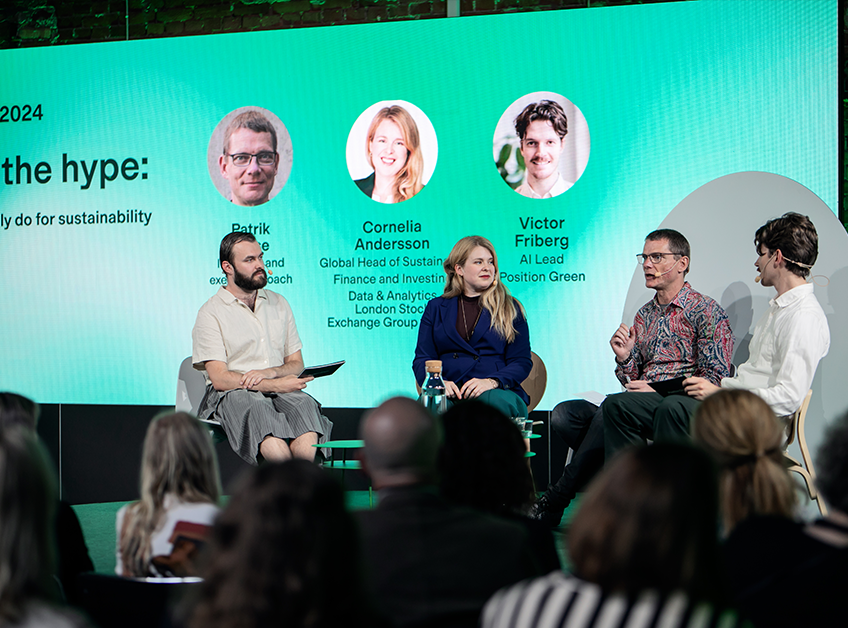Beyond the hype: what AI will actually do for sustainability

How AI can expedite sustainability
Many companies generate vast amounts of data, but the real challenge lies in what they do with it. AI can assist in gathering and processing data, suggesting conclusions, and proposing actionable insights. This allows sustainability professionals to concentrate on implementing impactful decisions rather than getting burdened with data analysis.
Scenario analysis, a critical component of sustainability planning, is another area where AI can excel. AI can handle complex variables and provide predictive analytics, offering valuable insights into potential future scenarios, including climate forecasts and economic simulations.
The environmental and financial costs of AI, particularly the energy consumption of data centers, however, cannot be ignored. It’s essential to balance the benefits of AI with its environmental impact, ensuring that its deployment contributes positively to sustainability efforts.
Integrating AI in sustainability platforms
One of the primary ways AI can enhance sustainability efforts is through its integration into data management platforms. AI can serve as an overarching system to connect different software and data sources and automate data collection. This integration would reduce the manual effort required to transfer data between systems, allowing for more efficient data collection and analysis.
In the future, AI could enable one-click reporting, freeing up valuable time for sustainability professionals to focus on meaningful impact rather than repetitive data gathering. By automatically picking up and processing data, AI can provide timely insights and streamlined reporting, making sustainability initiatives more effective and less labor-intensive.
One key question surrounding AI in sustainability is accountability. If AI systems handle data and provide recommendations, who is responsible for the outcomes? While AI can aid in data gathering and analysis, humans remain the ultimate decision-makers. Governance processes must be in place to ensure that AI is used responsibly and that humans stay one step ahead, ensuring fundamental decisions are informed by AI rather than made by it.

“By collaborating with AI, professionals can shift their focus from menial tasks to more strategic endeavors”
Victor Friberg – AI Lead
Position Green
The role of human oversight in AI
Despite the potential benefits, there is a pressing need to ensure that AI systems are trustworthy and reliable. It must be emphasized that humans are essential to the successful implementation of AI in sustainability. AI and sustainability are both mega-trends that will significantly alter how we approach environmental challenges, but they come with inherent risks that need careful management.
AI should be seen as a helper rather than an autonomous entity. Humans must guide and correct AI, as it is not infallible. Transparency and traceability are critical components in developing trustworthy AI systems. The reliability of AI heavily depends on the quality and completeness of the data it processes. Large gaps in data or unreliable data can lead to unreliable outcomes, underscoring the need for human oversight.
Governance and risk management processes are crucial. Before deploying AI, it is essential to identify the specific problems we want to solve, ensure the quality control of AI models and outputs, and establish robust auditing processes. Having a human in the loop is vital as they must set up processes and continuously guide and correct the AI systems.
Upskilling for AI in sustainability
For organizations to leverage AI effectively, there is a need to bridge the knowledge gap, particularly among business leaders. Just as sustainability has required a learning curve, so too will AI. Companies have a unique opportunity to experiment with AI and discover value-creating opportunities.
Problem definition remains more crucial than problem-solving. While AI can simulate human thinking, it is the human factor that identifies the right problems to address. By treating AI as a complementary partner, businesses can harness its power to reduce manual labor and unlock endless value creation opportunities.

Position Act 2024: Beyond the hype: what AI will actually do for sustainability
At our annual community event, Position Act, Victor Friberg (Position Green), Cornelia Andersson (LSEG), and Patrik Kruse (Progreat AB) participated in a panel to discuss AI’s potential to automate data analysis, reduce routine tasks, and enhance strategic sustainability initiatives. Incase you missed it, access the recording by filling out the form to find out more about what AI will actually do for sustainability according to experts.


